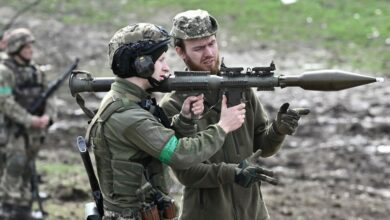Germany has almost exhausted its ability to supply Ukraine with weapons from its army reserves, but is working on direct deliveries from the arms industry, German Defense Minister Christine Lambrecht said Saturday.
“For deliveries coming from the Bundeswehr’s stocks, I have to say honestly that we have reached a limit,” she told German daily Augsburger Allgemeine.
The German army must maintain its capacity to act and be able to “guarantee the defense of the country and the (NATO) alliance,” she added.
“But that doesn’t mean we can’t do more for Ukraine, that’s why we have clarified what the industry can provide directly” to Kyiv, Lambrecht said.
Berlin is “continuously consulting with Ukraine on this subject.”
Until the Russian invasion on February 24, Germany had been reluctant for historical reasons to send weapons to Ukraine, which had been demanding them in the face of rising tensions with Moscow.
Chancellor Olaf Scholz then made a U-turn and Ukrainian forces have already received anti-tank weapons, missile launchers, and surface-to-air missiles from Berlin.
But the conflict in Ukraine has also cast a spotlight on the “alarming” state of the Bundeswehr, according to the Bundestag’s defense commissioner, Eva Hoegl, while one of the top brass spoke of an army “more or less dry.”
Ukrainian Foreign Minister Dmytro Kuleba on Thursday urged NATO members to quickly supply him with more military equipment, including heavy weapons.
“It is clear that Germany can do more, given its reservations,” he said.
The Ukrainians have asked Berlin to supply 100 Marder armored vehicles.
The Bundeswehr has such vehicles manufactured by the German firm Rheinmetall.
Rheinmetall could quickly prepare around 20 armored vehicles, currently undergoing maintenance, for Ukrainian forces, company boss Armin Papperger told Spiegel this week.
According to German media, the question of such a delivery is being debated by government security experts because it raises questions of technical feasibility, logistical delays, and the maintenance of the German arsenal.
Germany will this year significantly increase its military spending and create an exceptional fund of 100 billion euros ($110 billion) to modernize its army with the aim of reaching the two percent of GDP recommended by NATO.












